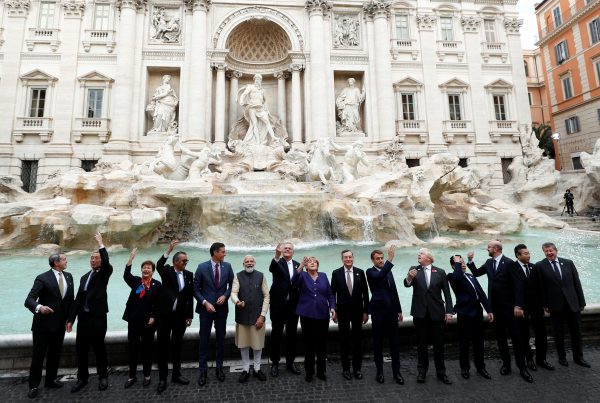The G20 is currently unable to function as the incubator for the reform of global governance institutions that the world needs to manage global markets and pressing systemic risks. It is proving unable to manage the great frictions between established and emerging powers.
There are three reasons for this. First, the United States, as the ongoing primary owner-operator of the liberal international order, is not interested in facilitating structural change at the global level. Second, the ever-accelerating US–China competition and the collapse of mutual trust between China and the West limit G20 possibilities. Third, most G20 leaders face domestic turmoil or extremely constraining domestic politics. It is hard to find any country where working for the global public good at the G20 resonates with domestic voters and can result in political rewards for leaders.
As a consensus-based multilateral process, the G20 can only deliver incremental progress over time. By that standard, the Rome Summit had a positive impact. It was the first functional G20 since 2016, thanks to the return of the United States to multilateralism. It succeeded in keeping alive one important function of the G20 — the generation of norms, regulations and goals that facilitate global cooperation and reduce tensions.
The Rome G20 cleared some air, changed the global conversation and offered shared commitments for others to mobilise around. The summit also enabled side conversations that resulted in some significant deals (the EU–US steel and aluminium deal), openings (Turkey–US) and crucial clarifications (the Blinken–Wang Yi meeting over Taiwan and other issues).
Reviewing the expected negative side of the ledger, we must start with the absence of six leaders (China, Russia, Japan, Mexico, Saudi Arabia and South Africa). These absences reflected the continuing stresses of the COVID-19 pandemic and the powerful inward forces of domestic politics, including unfortunate election scheduling for Japan. For China, Xi Jinping’s absence likely reflected the escalating opportunity cost of the national zero-COVID-19 strategy, intense political preoccupations linked to the forthcoming Fall 2022 Party Congress and decreased confidence in international diplomacy.
The Leaders’ Declaration remains a technical document unable to excite citizens around the world. The extensive section on the environment does not include precise targets, mechanisms or funding. The language on the crucial issue of inequality and exclusion does not do justice to the urgency and scale of the crisis. There is no credible agenda to address the WTO crisis, including the current paralysis of its dispute settlement mechanism. It is totally behind the curve on the massive acceleration of the digital and space economies, where new corporate giants currently operate in a near governance vacuum.
Still, this is not the whole story. Compared to G20 summits over the last four years, the Chair did not have to resort to 19 vs 1 contortions on climate, trade or sustainable development goals. The commitments to sustainable development goals and climate were unanimously reinforced. The Leader’s Statement goes further than ever before in acknowledging the climate crisis and codifying long-term aspirations.
For the first time, there is a strong indication that 1.5 degrees Celsius of warming should be a key target. The firm commitment to end all cross-border public financing for coal power plants is significant. Leaders also support the goal of protecting 30 per cent of land and oceans by 2030.
The G20 commitment to a minimum 15 per cent level of taxation for large global multinationals is a breakthrough, even though it will have to be legislated around the world through tax laws and revisions of tax treaties. Also significant is the shift in the taxation of digital profits being based on the place of consumption and not the place of physical production.
On COVID-19, the G20 merely accompanies the growing mobilisation of the private sector, the United States, China and others around the world to reach a 70 per cent vaccination rate by mid-2022. This codification of global targets is useful. So is the official support for mRNA vaccine manufacturing hubs in Africa and South America. The commitment to meaningful reforms and a budget increase of the World Health Organization and reforms of the International Health Regulations is a key move in the right direction.
Despite strong adverse currents, the Rome G20 Summit played a positive role in inserting common energy to counteract the growing entropy of global politics and coordinate various global actors toward common goals.
As for the incongruous, the prize goes to the photo of G20 leaders (without Joe Biden) throwing coins backward into the Trevi fountain, for collective good luck. This was not the best message to reassure the world that the G20 leaders know what they are doing.
Yves Tiberghien is Professor of Political Science and the Konwakai Chair in Japanese Research at the University of British Columbia. He is a Distinguished Fellow at the Asia-Pacific Foundation of Canada and the Canadian PAFTAD Chair.

